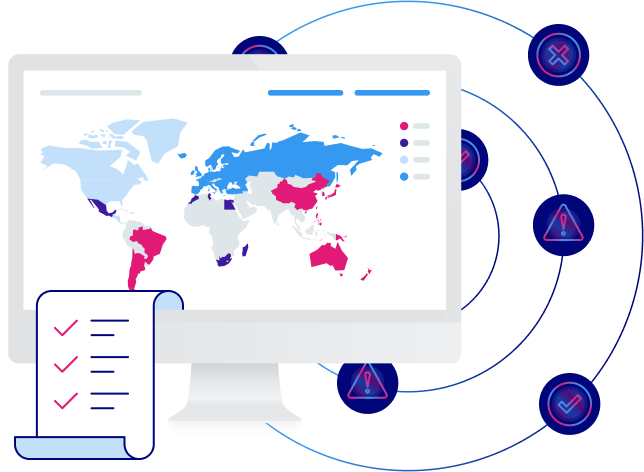-
Solutions
- AI Governance
- Responsible AI
- Geo-Specific Cookie Banner
- Consumer Preference Management
- Data Subject Request Automation
- Data Mapping and Vendor Risk Management
- Migrate
- Privacy, Vendor, and Risk Assessments
- Privacy Program Management
- Regulatory Guidance
- Privacy Program Consulting
- Certifications and Verifications
- International Data Transfers
Forrester TEI ROI of Privacy ReportTrustArc commissioned a Forrester study to analyze the potential benefits of using our platform and the Forrester team found ROI linked to efficiency, compliance, and decreased cost in data breaches.
Read the report -
Products Products Privacy Studio Overview
Automate consent and data subject rights compliance. Design seamless privacy experiences to enhance customer trust across your digital landscape.
- Cookie Consent Manager Effortlessly manage cookie consent for global compliance, ensuring a secure, personalized browsing experience.
- Consent & Preference Manager Easily manage and orchestrate customer consent and preferences across brands and channels.
- Individual Rights Manager Automate and streamline DSR workflows to ensure compliance and show your commitment to customer rights.
- Trust Center Centralize policies, disclosures, and trust-building information in a customizable no-code hub that speeds up deals.
Products Governance Suite OverviewStay ahead of privacy and compliance regulations. Simplify data privacy management and ensure data governance with cutting-edge apps.
- PrivacyCentral Centralize privacy tasks, automate your program, and seamlessly align with laws and regulations.
- Data Mapping & Risk Manager Gain full visibility and control of your data and accurately identify and mitigate risks.
- Assessment Manager Automate and score privacy assessments like PIAs and AI Risk, streamlining your compliance workflow.
- Nymity Research Get instant access to the latest in privacy regulations, legal summaries, and operational templates.
Products Assurance Services OverviewGain trust and credibility with leading privacy certifications from unbiased experts, backed by technology for unmatched privacy compliance assurance.
- Dispute Resolution
- TRUSTe Global CBPR and PRP Certification
- Data Privacy Framework Verification
- TRUSTe APEC CBPR and PRP Certification
- TRUSTe Responsible AI Certification
- TRUSTe Enterprise Privacy Certification
- CCPA/CPRA Validation
- GDPR Validation
- TRUSTe Data Collection Certification
- TRUSTe EDAA Privacy Certification
- Digital Advertising Alliance Validation
-
Regulations
- EU General Data Protection Regulation (GDPR)
- California Consumer Privacy Act (CCPA)
- Virginia Consumer Data Protection Act (CDPA)
- NIST AI Framework
- ISO/IEC 27001
EU Artificial Intelligence Act (EU AI Act)EU's regulation on the use of AI and the world's first comprehensive AI law.
Learn moreIndia Digital Personal Data Protection ActComprehensive data protection law governing the processing of personal data of Indian citizens.
Learn more - Resources
- Arc ✦
- Contact us
Philippines’ Data Privacy Act
The Philippines’ privacy law, known as the Data Privacy Act of 2012, provides its residents with data privacy rights and data privacy obligations for organizations handling their data. It established the National Privacy Commission, an autonomous entity tasked with overseeing and enforcing compliance with the provisions outlined within this law.
Are you subject to the Philippines’ Data Privacy Act?
The Philippines’ Data Privacy Act of 2012 applies to any organizations worldwide that process the personal information of Philippine residents, irrespective of their location, and/or meet any one of the following criteria: (1) use equipment located in the Philippines and/or (2) maintain an office, branch, or agency in the Philippines.
Obligations & Rights under the Philippines’ Data Privacy Act
This data privacy and protection law requires organizations to provide control and transparency to Philippine residents on how their personal information is collected, processed, and disclosed.
-
Consent & Opt-out
Prior consent is mandatory before processing an individual’s information. Individuals have the right to suspend or withdraw consent to processing if they discover and substantiate that their data is incomplete, outdated, false, unlawfully obtained, utilized for unauthorized purposes, or no longer necessary for the original purposes of collection.
-
Notice to Individuals
Individuals must be notified whether their personal information is being or has been processed. Notice must be provided before personal information enters the processing system or at the earliest possible opportunity thereafter. Any information provided to individuals regarding their personal information cannot be changed unless individuals are provided prior notification.
-
Individual Rights
Individuals have the right to be informed, access, correct, suspend, withdraw, and delete their personal information, alongside the ability to exercise data portability rights. They are also entitled to indemnification for any damages incurred as a result of inaccurate, incomplete, outdated, false, unlawfully obtained, or unauthorized use of their personal information.
-
Vendor Management
Controllers must employ contractual or other reasonable measures to ensure a comparable level of protection when personal information is processed by a third party vendor regardless of the vendor’s location.

CBPR – Navigating Cross-Border Data Privacy Compliance
The CBPR system is an internationally recognized framework and certification.
Achieve compliance
-
Complete and maintain a data inventory Automate with a Data Inventory Hub. Save time and reduce risk with automated data flow mapping, risk analysis, and remediation for personal data processes and general activities associated.
-
Mitigate risks Mitigate risks efficiently with TrustArc’s Assessment Manager. Utilize pre-built Data Protection Impact Assessments (DPIAs) and vendor assessments to ensure thorough risk management and compliance with industry standards.
-
Exercising individual rights Enjoy Data Subject Request (DSR) automation with TrustArc’s Individual Rights Manager. Easily operationalize individual rights according to specific jurisdictions, leverage automated workflows to save time, and keep an audit trail of requests/actions.

FAQs
- Is a Data Protection Officer (DPO) required under the Philippine’s Data Privacy Act of 2012?
- Does the Philippines’ Data Privacy Act of 2012 require the establishment of a security program?
- What is personal information and sensitive personal information under the Philippines’ Data Privacy Act of 2012?
The information provided does not, and is not intended to, constitute legal advice. Instead, all information, content, and materials presented are for general informational purposes only.





